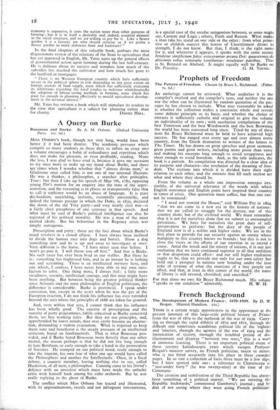A Query on Burke
Miss OSBORN'S book, though not very long, would have been better if it had been shorter. The academic pressure which compels so many students in these days to inflate an essay into
• a volume encourages a habit of redundancy and repetition which does not make for pleasant, or even profitable, reading. None the less, I was glad to have read it, because it gave me occasion to try once more to make up my mind about Burke, and there are times when I wonder whether that "almost divine man," as Gladstone once called him, is not one of our national illusions. He was a thinker, a philosopher, a searcher after principles. True : but then I take up his speech of May 7th, 1782, opposing young Pitt's motion for an enquiry into the state of the repre- sentation, and the reasoning is in places so transparently false that to call it sophistry would be an abuse of language. It is pure die-hardism, unyielding, inelastic essentially unscientific, and indeed the famous passage in which the Duke, in 1830, declared the doom of the old Tory party—and very nearly civil war—is a fairly close paraphrase of one sentence in that speech. And what must be said of Burke's political intelligence can also be - repeated of his political morality. He was a man of the most exalted ideals. But his behaviour in the Regency crisis was simply outrageous.
.Prescription and party: these are the foci about which Burke's mind revolves in a closed ellipse. I have always been inclined to divide the human race into dogs and horses. Show a dog something new and he is up and away to investigate at once. Very different is the horse. "I have never seen that before. I won't go past it. I will throw you off first." And that is Burke. No such racer has ever been bred in our stables. But there he is : something has frightened him, and in an instant he is lashing out and screaming. There is an intellectual mystery here, and one which, I confess, I have never been able to my own satis- faction to solve. One thing more, I always feel: a little more steadiness, serenity, intellectual courage, and this man might have been anything. But between being the greatest political thinker since Aristotle and the most philosophic of English politicians, the difference is considerable. Burke is provincial. I speak under correction, but, except in the years when he was the pet of the European reaction, I do not think his influence has ever extended beyond the area where the principles of i688 are taken for granted.
And, even within that area, I cannot think that his influence has been wholly good. The sanctity of prescription and the sanctity of party prograttimes, loftily conceived as Burke conceived them, are fine working rules. But they are not principles, and, apprehended by lower minds, they may easily become an obstruc- tion, demanding a violent evacuation. What is required to keep them sane and beneficent is the steady pressure of an intellectual criticism, based on fundamentals. That is what Rousseau pro- vided, and if Burke hated Rousseau more fiercely than any other mortal, the reason perhaps is that he did not live long enough to hate Bentham, or early enough to take a hand in the prosecution of Socrates. He stamped on our political mind, ready enough to take the imprint, his own fear of what one age would have called the Philosophers and another the Intellectuals. Once, in a fiscal debate, a country member, having nothing else to say, called Huskisson, of all men, a philosopher. Canning came to his friend's defence with an invective which must have made the unlucky critic wish himself back among his cider orchards. But he was really replying to the ghost of Burke.
. The conflict which Miss Osborn has traced and illustrated, with its approximations, recoils and not infrequent intersections,
is a special case of the secular antagonism between, as some might say, Custom and Logic ; others, Faith and Reason. What makes a man take his stand on one side or the other : from what primi- tive or childish sources this horror of Unsettlement draws its strength, I do not know. But that, I think, is the right name for it, and whenever it appears, it speaks with the same accent. Irridetur simplicium fides: eviscerantur arcana Del: quaestiones de altissimis rebus temerarie ventilantur: insultatur patribus. That is St. Bernard on Abelard. It might equally well be Burke on






























 Previous page
Previous page